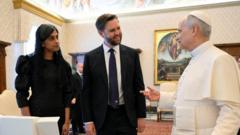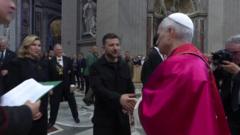The new pope symbolizes a blend of cultural backgrounds and clerical experience, reflecting a progressive shift in the Vatican's leadership dynamics.
# Pope Leo XIV: An American Influence Reshaping the Vatican

# Pope Leo XIV: An American Influence Reshaping the Vatican
Pope Leo XIV's unexpected election marks a pivotal moment for the Catholic Church and its global outreach.
In a surprising turn of events, Pope Leo XIV was elected on May 8, 2025, leaving the Catholic global community in awe. His background as Robert Francis Prevost intricately combines American roots and extensive experience in Latin America, marking a strategic choice for the Church's future.
Born and raised in the United States, Prevost has held influential positions within the Vatican, culminating in his role as the head of the Pontifical Commission for Latin America, where he worked closely with Pope Francis. His dedication to reforming the Catholic Church’s decision-making processes has endeared him to liberal factions while maintaining conservative approval with his solid theological credentials.
At the age of 69, Leo XIV's election represents a calculated choice; he embodies a unique duality by being both familiar with the Church's traditional values and capable of navigating its complex modern landscape. The American nationality, once perceived as a hurdle, is now seemingly irrelevant as the Church prioritizes broader global representation in its leadership.
John Allen, a noted Vatican analyst, underscored how Leo XIV “checked all the boxes,” suggesting a significant evolution in the criteria for papal candidates. It appears that geographical and national considerations have shifted in a Church eager to embrace diverse influences.
As Pope Leo XIV steps into his new role, many are optimistic about his potential to unite a divided Church and inspire a new generation of faithful followers across the globe. The future of the Catholic Church may indeed be brighter under his leadership.
Born and raised in the United States, Prevost has held influential positions within the Vatican, culminating in his role as the head of the Pontifical Commission for Latin America, where he worked closely with Pope Francis. His dedication to reforming the Catholic Church’s decision-making processes has endeared him to liberal factions while maintaining conservative approval with his solid theological credentials.
At the age of 69, Leo XIV's election represents a calculated choice; he embodies a unique duality by being both familiar with the Church's traditional values and capable of navigating its complex modern landscape. The American nationality, once perceived as a hurdle, is now seemingly irrelevant as the Church prioritizes broader global representation in its leadership.
John Allen, a noted Vatican analyst, underscored how Leo XIV “checked all the boxes,” suggesting a significant evolution in the criteria for papal candidates. It appears that geographical and national considerations have shifted in a Church eager to embrace diverse influences.
As Pope Leo XIV steps into his new role, many are optimistic about his potential to unite a divided Church and inspire a new generation of faithful followers across the globe. The future of the Catholic Church may indeed be brighter under his leadership.




















